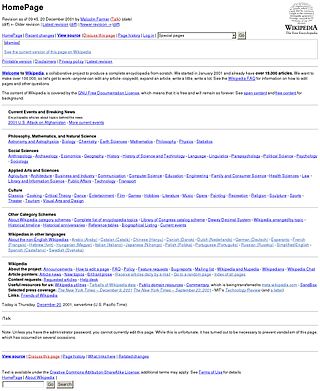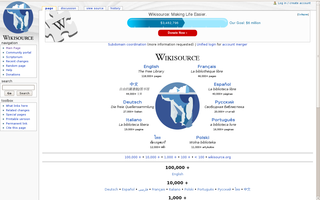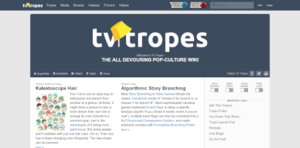
Wikipedia, a free-content online encyclopedia written and maintained by a community of volunteers known as Wikipedians, began with its first edit on 15 January 2001, two days after the domain was registered. It grew out of Nupedia, a more structured free encyclopedia, as a way to allow easier and faster drafting of articles and translations.

MediaWiki is a free and open-source wiki software originally developed by Magnus Manske for use on Wikipedia on January 25, 2002, and further improved by Lee Daniel Crocker, after which it has been coordinated by the Wikimedia Foundation. It powers several wiki hosting websites across the Internet, as well as most websites hosted by the Foundation including Wikipedia, Wiktionary, Wikimedia Commons, Wikiquote, Meta-Wiki and Wikidata, which define a large part of the set requirements for the software. MediaWiki is written in the PHP programming language and stores all text content into a database. The software is optimized to efficiently handle large projects, which can have terabytes of content and hundreds of thousands of views per second. Because Wikipedia is one of the world's largest and most visited websites, achieving scalability through multiple layers of caching and database replication has been a major concern for developers. Another major aspect of MediaWiki is its internationalization; its interface is available in more than 400 languages. The software has more than 1,000 configuration settings and more than 1,800 extensions available for enabling various features to be added or changed. Besides its usage on Wikimedia sites, MediaWiki has been used as a knowledge management and content management system on websites such as Fandom, wikiHow and major internal installations like Intellipedia and Diplopedia.

Wikisource is an online digital library of free-content textual sources on a wiki, operated by the Wikimedia Foundation. Wikisource is the name of the project as a whole and the name for each instance of that project ; multiple Wikisources make up the overall project of Wikisource. The project's aim is to host all forms of free text, in many languages, and translations. Originally conceived as an archive to store useful or important historical texts, it has expanded to become a general-content library. The project officially began on November 24, 2003, under the name Project Sourceberg, a play on Project Gutenberg. The name Wikisource was adopted later that year and it received its own domain name.

Wookieepedia: The Star Wars Wiki is an online encyclopedia for information about the Star Wars universe—including information on all the films, the books, as well as Clone Wars, The Clone Wars and its introductory film, Rebels, the Star Wars Expanded Universe, and any upcoming Star Wars material. It is a wiki focused on the Star Wars universe with some articles reaching up to 60,000 words, and is written almost entirely from an in-universe perspective. The name is a portmanteau of Wookiee and encyclopedia, a pun on the name of Wikipedia. The logo, too, is a visual pun showing the incomplete second Death Star as opposed to Wikipedia's incomplete "jigsaw logo".

wikiHow is an online wiki-style publication featuring how-to articles and quizzes on a variety of topics. Founded in 2005 by Internet entrepreneur Jack Herrick, its aim is to create an extensive database of instructional content, using the wiki model of open collaboration to allow users to add, create, and modify content. It is a hybrid organization, a for-profit company run for a social mission. wikiHow uses a forked version of the free and open-source MediaWiki software; these modifications made by wikiHow were freely available to the general public via a self-serve download site from 2010 to late 2020, when wikiHow chose to discontinue the self-serve portal, citing vague "DoS attacks", as well as noting that publishing the source code is "not part of our core mission". The site's text content is released under a Creative Commons NonCommercial license.

Jimmy Donal "Jimbo" Wales, is a British-American Internet entrepreneur, webmaster, and former financial trader. He is a co-founder of Wikipedia and the for-profit wiki hosting service Fandom. He has worked on other online projects, including Bomis, Nupedia, WikiTribune, and WT Social.

Baidu Baike is a semi-regulated Chinese-language collaborative online encyclopedia owned by the Chinese technology company Baidu. The beta version was launched on April 20, 2006, and the official version was launched on April 21, 2008, edited by registered users. As of February 2022, it has 25.54 million entries and more than 7.5 million editors. It has the largest number of entries in the world of any Chinese-language online encyclopedia.

Conservapedia is an English-language, wiki-based, online encyclopedia written from a self-described American conservative and fundamentalist Christian point of view. The website was established in 2006 by American homeschool teacher and attorney Andrew Schlafly, son of the conservative activist Phyllis Schlafly, to counter what he perceived as a liberal bias in Wikipedia. It uses editorials and a wiki-based system for content generation.

WikiScanner was a publicly searchable database that linked anonymous edits on Wikipedia to the organizations where those edits apparently originated. It did this by cross-referencing the edits with data on the owners of the associated block of IP addresses, though it did not investigate edits made under a username. It was created by Virgil Griffith and released on August 13, 2007.

WikiPilipinas is an online, free content website which bills itself as a combination "non-academic encyclopedia", web portal, directory and almanac for Philippine-based knowledge. Like Wikipedia, it contains various articles on Philippine-related topics. Unlike Wikipedia, many of the articles cover topics that would otherwise be deemed unencyclopedic by the stricter Wikipedia. The service for example, promotes the concept of original research and eschews the larger encyclopedia's neutral point-of-view principle.

Uncyclopedia is several forks of satirical online encyclopedias that parody Wikipedia. Its logo, a hollow "puzzle potato", parodies Wikipedia's globe puzzle logo, and it styles itself as "the content-free encyclopedia", parodying Wikipedia's slogan of "the free encyclopedia" and likely as a play the fact that Wikipedia is described as a “free-content” encyclopedia. Founded in 2005 as an English-language wiki, the project spans more than 75 languages as well as several subprojects parodying other wikis. Uncyclopedia's name is a portmanteau of the prefix un- and the word encyclopedia.

The history of wikis began in 1994, when Ward Cunningham gave the name "WikiWikiWeb" to the knowledge base, which ran on his company's website at c2.com, and the wiki software that powered it. The wiki went public in March 1995, the date used in anniversary celebrations of the wiki's origins. c2.com is thus the first true wiki, or a website with pages and links that can be easily edited via the browser, with a reliable version history for each page. He chose "WikiWikiWeb" as the name based on his memories of the "Wiki Wiki Shuttle" at Honolulu International Airport, and because "wiki" is the Hawaiian word for "quick".

The Wikimedia Foundation, Inc., abbreviated WMF, is an American 501(c)(3) nonprofit organization headquartered in San Francisco, California, and registered there as a charitable foundation. It is the host of Wikipedia, the seventh most visited website in the world. In addition, the foundation hosts 14 other related content projects. It supports the development of MediaWiki, the wiki software that underpins them all.

Wikitravel is a web-based collaborative travel guide based on the wiki format and owned by Internet Brands. It was most active from 2003 through 2012, when most of its editing community left and brought their contributions to the nonprofit Wikivoyage guide.

Deletionpedia was an online archive wiki containing articles deleted from the English Wikipedia. Its version of each article included a header with more information about the deletion such as whether a speedy deletion occurred, where the deletion discussion about the article can be found and which editor deleted the article. The original Deletionpedia operated from February to September 2008. The site was restarted under new management in December 2013.

Fandom is a wiki hosting service that hosts wikis mainly on entertainment topics. The privately held, for-profit Delaware company was founded in October 2004 by Wikipedia co-founder Jimmy Wales and Angela Beesley. Fandom was acquired in 2018 by TPG Inc. and Jon Miller through Integrated Media Co.

The Wikipedia community, collectively and individually known as Wikipedians, is an online community of volunteers who create and maintain Wikipedia, an online encyclopedia. Since August 2012, the word "Wikipedian" has been an Oxford Dictionary entry.

Kiwix is a free and open-source offline web browser created by Emmanuel Engelhart and Renaud Gaudin in 2007. It was first launched to allow offline access to Wikipedia, but has since expanded to include other projects from the Wikimedia Foundation, public domain texts from Project Gutenberg, many of the Stack Exchange sites, and many other resources. Available in more than 100 languages, Kiwix has been included in several high-profile projects, from smuggling operations in North Korea to Google Impact Challenge's recipient Bibliothèques Sans Frontières.
Conflict-of-interest (COI) editing on Wikipedia occurs when editors use Wikipedia to advance the interests of their external roles or relationships. The type of COI editing of most concern on Wikipedia is paid editing for public relations (PR) purposes. Several Wikipedia policies and guidelines exist to combat conflict of interest editing, including Wikipedia:Conflict of interest and Wikipedia:Paid-contribution disclosure.

Chris Richmond is an American businessman and entrepreneur. He founded a television streaming site called ShareTV.com, co-founded an adtech platform called Proper Media and acquired websites such as TV Tropes, Snopes, and Salon.com.


















